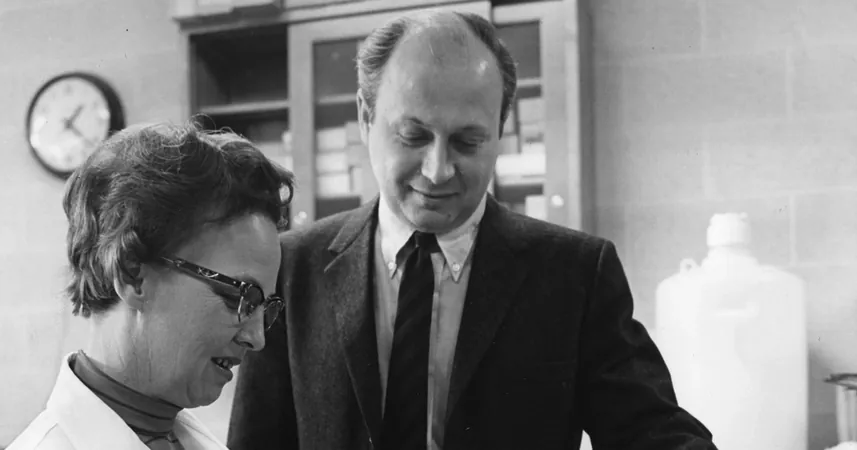
Michigan State University’s Breakthrough Cancer Drug Cisplatin Honored with 2025 Golden Goose Award
2025-09-03
Author: Yu
A Historic Discovery That Changed Cancer Treatment Forever
In a remarkable tale of serendipity, researchers from Michigan State University (MSU) stumbled upon a groundbreaking cancer-fighting drug in 1965: cisplatin. Fast forward to today, and this remarkable discovery has become the gold standard in chemotherapy, saving countless lives worldwide.
A Prestigious Honor for Lifesaving Research
MSU is set to receive the 2025 Golden Goose Award, recognizing the profound global impact of cisplatin. This prestigious accolade celebrates the often-overlooked benefits of curiosity-driven research, emphasizing that fundamental scientific inquiry can lead to extraordinary advancements in society.
The award ceremony will take place on September 16 at the Library of Congress in Washington, D.C., where legislators will discuss the vital role of federal funding in advancing scientific exploration.
A Voice of Appreciation
Doug Gage, MSU’s Vice President for Research and Innovation, expressed his excitement: "We are thrilled to have this important discovery honored but what’s truly significant are the countless lives saved by cisplatin. This story exemplifies how fundamental research can yield life-changing results in entirely different fields."
How an Accidental Experiment Changed Medicine
Originally discovered in 1844 by Italian chemist Michele Peyrone, cisplatin was largely forgotten until MSU's Professor Barnett "Barney" Rosenberg explored its electric properties as part of research on bacterial growth. Noticing that bacteria struggled to thrive near a platinum electrode, Rosenberg shifted his focus and conducted further experiments, ultimately finding that platinum compounds slow down cancer cell division by interfering with DNA replication. This accidental windfall paved the way for cisplatin, which gained FDA approval in 1978 after a 13-year journey, significantly bolstered by federal funding.
Transformative Impact on Cancer Treatment
Cisplatin has revolutionized treatment for various cancers, particularly testicular cancer, where survival rates have soared from around 10% to an astonishing 90%. The drug is also crucial for treating ovarian, bladder, lung, and stomach cancers. In the U.S., approximately 9,760 men are diagnosed with testicular cancer each year, making cisplatin’s impact vital. Historically, the prognosis was grim for those diagnosed in the 1960s, but today, the survival rate has dramatically improved to about 95%.
A Survivor’s Story
Among those whose lives have been saved by cisplatin is Olympic figure skater Scott Hamilton, who battled stage 3 testicular cancer. Reflecting on his diagnosis, Hamilton recalled, "When they told me, I wanted it to be something else, but they assured me this was the best possible scenario. I’m grateful for proven treatments, as many cancers lack such options."
Ongoing Legacy and Future Innovations
Today, cisplatin remains one of the most effective cancer treatments and was added to the World Health Organization's Essential Medicines List in 2015 for its crucial role in treating early-stage cervical cancer.
Moreover, the royalties from cisplatin and its derivative carboplatin continue to support groundbreaking research initiatives at MSU, showcasing the enduring legacy of a discovery born out of curiosity and determination.


 Brasil (PT)
Brasil (PT)
 Canada (EN)
Canada (EN)
 Chile (ES)
Chile (ES)
 Česko (CS)
Česko (CS)
 대한민국 (KO)
대한민국 (KO)
 España (ES)
España (ES)
 France (FR)
France (FR)
 Hong Kong (EN)
Hong Kong (EN)
 Italia (IT)
Italia (IT)
 日本 (JA)
日本 (JA)
 Magyarország (HU)
Magyarország (HU)
 Norge (NO)
Norge (NO)
 Polska (PL)
Polska (PL)
 Schweiz (DE)
Schweiz (DE)
 Singapore (EN)
Singapore (EN)
 Sverige (SV)
Sverige (SV)
 Suomi (FI)
Suomi (FI)
 Türkiye (TR)
Türkiye (TR)
 الإمارات العربية المتحدة (AR)
الإمارات العربية المتحدة (AR)